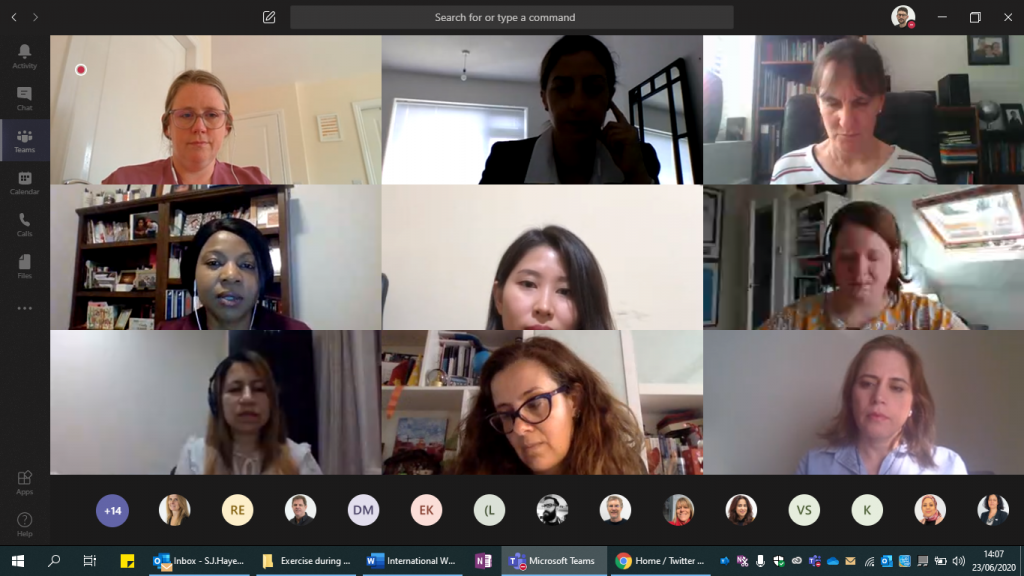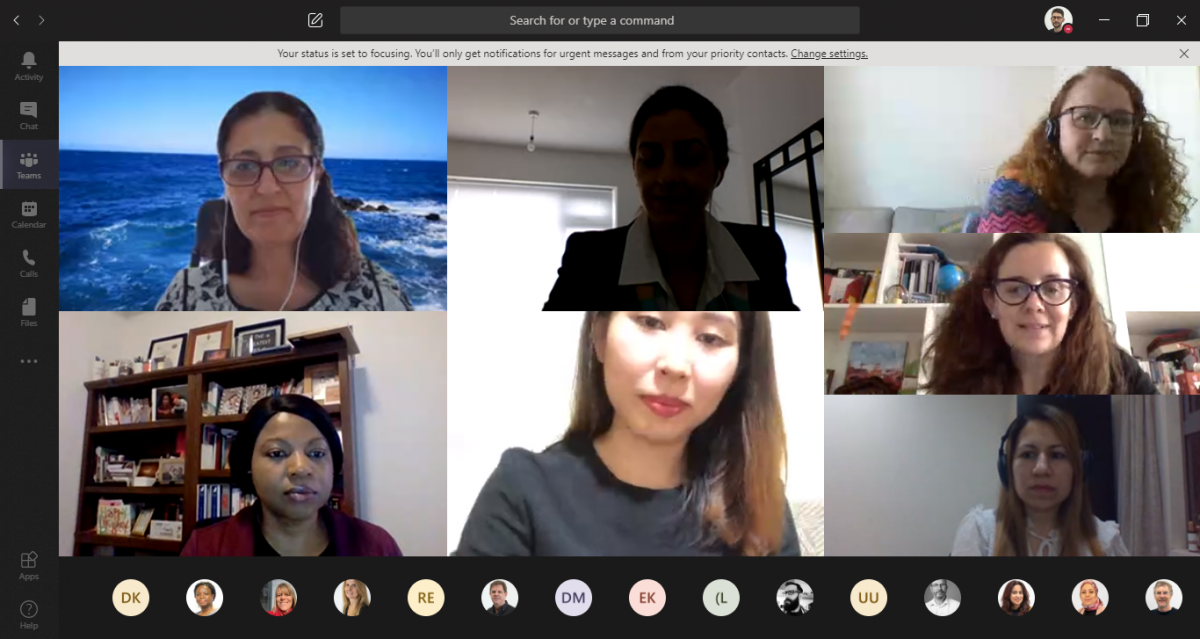Resilience of Women in STEM: Surviving Covid-19 lock-down
The 23 June 2020 was International Women in Engineering Day – #INWED20 – and, as we have done in previous years, Salford wanted to celebrate. Typically, we might welcome local school children into our buildings for demonstrations or hold face-to-face talks. This year has been different of course. However, undeterred Prof. Haifa Takruri MBE set about organising an online panel discussion. Being able to draw on the skills and experiences of Salford Alumni from across the world meant we were able to put together a panel of inspirational women.
We asked our panel to speak about their experiences of lockdown and coronavirus disruption. We know that lots of talks have become dominated by coronavirus recently; however, we also know that in this disruption women are more likely to have picked up additional domestic and caring responsibilities. For sectors where women are already underrepresented, undervalued or under-promoted disruptive events like this could have a dramatic impact on career progression and hard-won equality gains.
The panel included a range of experts from various engineering and related disciplines and working across a wide breadth of sectors from architecture to pharmaceuticals. Our panel was also global, with speakers here in the UK, and from Canada, Singapore (via Myanmar), UAE and New Zealand. Technology, in this case, enabling us to bend time zones and invite even more speakers – to whom we are extremely grateful for getting up early, taking time out of their workday or staying up late.
Thank you to our panel!
- Duaa Al-Hamed, Data Telecommunication and Networks, Lecturer/PhD candidate, Auckland University, New Zealand
- Dr Sara Biscaya , Built Environment, Lecturer in Architecture, University of Salford, UK
- Karimah Es Sabar, Biochemistry, Chief Executive Officer & Partner, Quark Venture LP Vancouver, British Columbia, Canada
- Dr Claire Hendby, Honorary PhD from University of Salford, Director at Deloitte, UK
- Dr Diana Kennedy, Mechanical Engineering, Vice President, Strategy, Architecture and Planning, BP, UK
- Dr Shafaq Khan, Computer Science, Assistant Professor, Zayed University, UAE
- May Phyu Kyaw, Data Telecommunication and Networks, Pre-sales and Solutions Partner, Orange, Singapore
- Dr Marina Leontiadou, Physics, Lecturer, University of Salford, UK
- Helen Sheldon, Physics with Acoustics, Associate, RBA Acoustics Ltd
- Shola Slough, Electronic and Electrical Engineering, Product Marketing Specialist, ON Semiconductors, Ontario, Canada
- Dr Melisa Sterry, Built Environment, Design Scientist, Systems Theorist, and Futurist, Global
- Vicky Stewart, Audio Technology, Associate Acoustic Consultant and National STEM Coordinator, Atkins, UK

Each panellist shared their own reflections on their lockdown experiences, the disruption and how they have been supported or supported fellow colleagues as workplaces adjusted to new working patterns.
So much was shared so generously that it’s hard to summarise it here, but I will try to pick out some of the recurring themes.
Technology to the rescue?
We spoke a lot about how technology has been deployed to enable team meetings, remote working and generally staying in touch. But as one panellist noted, meeting via video has partly helped to humanise colleagues and technology. Perhaps most famously demonstrated by Professor Robert Kelly and family but also the zoom cat cameo all mean that we have had to accept the human side of colleagues as partners, children and pets all pop up unexpectedly on screen without warning. Not to mention that hairdressers and barbers have been closed for weeks… Accepting a more relaxed approach to digital presentation seemed popular, but for those keen to maintain some mystery remember you can always get creative with your background.
The rapid and considerable move to remote working also possibly demonstrates or creates opportunities to work in different locations and communicate with a wider network as logistics of travel are removed with the event itself being an excellent example. We also talked about how meeting dynamics might be changing as we all occupy the same little boxes on a screen. With the chairperson no longer occupying the seat at the head of the table, maybe meetings can become more inclusive? An interesting thought, and something to be considered alongside other potential inequalities of technology perhaps.
Blurred boundaries, solid structures and transient timetables
With so many now working at home, work-life boundaries were a hot topic. Several of our panellists shared how their early in their lockdown experiences they had lost sight of the boundaries between work and home lives. This is completely understandable, as for many work and the rest of their life were now mostly happening in the same space. Work-life balance and ‘always-on culture’ is obviously not a new concern, but something intensified by lockdown. It was generally felt to be important to maintain the balance and take some time out. For some though, their new responsibilities for daytime childcare and education for example, meant that boundaries have had to shift. Taking advantage of employers’ openness to more flexible working has been important for some. Being able to fit work in earlier or later than ‘normal’ has helped. With such an illustrious group we benefitted from contributions from some very senior professionals and they agreed. Trusting your employees to manage their time is important, establish structures to make sure things don’t fall through the cracks, but trust your people.
We managed to gather some tips. Setting up structures for children to follow seemed to have worked well. Things like preparing lunches and snacks ahead of time and drawing up a ‘school’ day timetable. We also heard that using your previous commute time to take a walk had helped some to make distinctions between work and down-time and helped them to stay active. Finding what works for you and your situation is important, and across our panel people’s new working lives looked quite different.
Some tentative benefits?
More time spent at home means more opportunities to be at home with family and to eat with the family. More flexible (sometimes out of necessity) working hours has provided opportunities to take a walk or cycle during the day. Others have taken the opportunity to cook new recipes. No pressure from us to take up a new hobby or learn a skill during lockdown, but we found agreement on the need to allow yourself some time to take a break.
Final thoughts
Know your value. Easier said than done, but this certainly chimes with our ethos as a group working on gender equality in academia. Here at Salford our gender pay gap has been closing and stands at 11.2 – 11.6%. Something we as a group will continue to focus on and will keep a close eye on how Coronavirus might be impacting on this and other equality issues.
And as one panellist suggested, we should remind ourselves to take a break. Here’s a friendly reminder: eat lunch!

